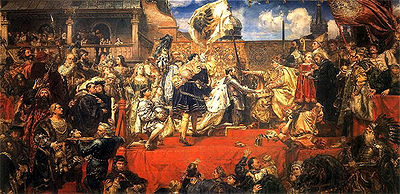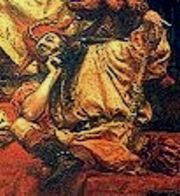
Prussian Homage
Encyclopedia


Investiture
Investiture, from the Latin is a rather general term for the formal installation of an incumbent...
of Albert of Prussia as duke of the Polish
Poland
Poland , officially the Republic of Poland , is a country in Central Europe bordered by Germany to the west; the Czech Republic and Slovakia to the south; Ukraine, Belarus and Lithuania to the east; and the Baltic Sea and Kaliningrad Oblast, a Russian exclave, to the north...
fief of Ducal Prussia.
In the aftermath of the armistice ending the Polish-Teutonic War Albert, Grand Master of the Teutonic Knights and a member of the House of Hohenzollern
House of Hohenzollern
The House of Hohenzollern is a noble family and royal dynasty of electors, kings and emperors of Prussia, Germany and Romania. It originated in the area around the town of Hechingen in Swabia during the 11th century. They took their name from their ancestral home, the Burg Hohenzollern castle near...
, visited Martin Luther
Martin Luther
Martin Luther was a German priest, professor of theology and iconic figure of the Protestant Reformation. He strongly disputed the claim that freedom from God's punishment for sin could be purchased with money. He confronted indulgence salesman Johann Tetzel with his Ninety-Five Theses in 1517...
at Wittenberg
Wittenberg
Wittenberg, officially Lutherstadt Wittenberg, is a city in Germany in the Bundesland Saxony-Anhalt, on the river Elbe. It has a population of about 50,000....
and soon thereafter became sympathetic to Protestantism
Protestantism
Protestantism is one of the three major groupings within Christianity. It is a movement that began in Germany in the early 16th century as a reaction against medieval Roman Catholic doctrines and practices, especially in regards to salvation, justification, and ecclesiology.The doctrines of the...
. On April 10, 1525, two days after signing of the Treaty of Kraków
Treaty of Kraków
Treaty of Kraków was signed on 8 April 1525 between Kingdom of Poland and the Grand Master of the Teutonic Knights. It officially ended the Polish-Teutonic War....
, in the market of the Polish capital Kraków
Kraków
Kraków also Krakow, or Cracow , is the second largest and one of the oldest cities in Poland. Situated on the Vistula River in the Lesser Poland region, the city dates back to the 7th century. Kraków has traditionally been one of the leading centres of Polish academic, cultural, and artistic life...
, Albert resigned his position as Grand Master of the Teutonic Knights
Teutonic Knights
The Order of Brothers of the German House of Saint Mary in Jerusalem , commonly the Teutonic Order , is a German medieval military order, in modern times a purely religious Catholic order...
to become a Lutheran
Lutheranism
Lutheranism is a major branch of Western Christianity that identifies with the theology of Martin Luther, a German reformer. Luther's efforts to reform the theology and practice of the church launched the Protestant Reformation...
and received the title "Duke of Prussia" from his uncle King Zygmunt I the Old of Poland. In a deal partially brokered by Luther, the Duchy of Prussia became the first Protestant state, anticipating the Peace of Augsburg
Peace of Augsburg
The Peace of Augsburg, also called the Augsburg Settlement, was a treaty between Charles V and the forces of the Schmalkaldic League, an alliance of Lutheran princes, on September 25, 1555, at the imperial city of Augsburg, now in present-day Bavaria, Germany.It officially ended the religious...
of 1555. Nevertheless investiture
Investiture
Investiture, from the Latin is a rather general term for the formal installation of an incumbent...
of Protestant fief of Duchy of Prussia was better for Poland for geostrategic reasons than Catholic fief of State of Teutonic Order in Prussia, formally subjected to the Holy Roman Emperor
Holy Roman Emperor
The Holy Roman Emperor is a term used by historians to denote a medieval ruler who, as German King, had also received the title of "Emperor of the Romans" from the Pope...
and Papacy.

